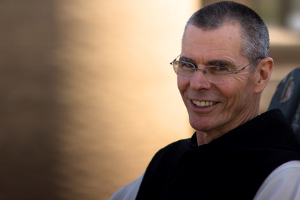Wednesday in the Fourth Week of Easter
[Scripture Readings: Acts 12:24-13:5A; John 12:44-50]

Jesus' salvific mission is universal. He describes himself, then, as a door. Jesus is an open door, welcoming of all. "I did not come to condemn the world, but to save the world."
The Holy Spirit said of Barnabas and Saul, "Set them apart for the work to which I have called them." They are then set apart, but they discover the work they have been called to only after a time. We will hear about that on Saturday. For now, they do what seems necessary and sufficient: they proclaimed the word of God in the Jewish synagogues. Only later does the mission he was set apart for dawn on Paul: "we now turn to the Gentiles." It is a mission beyond the merely necessary. Paul's work was to show that the dividing wall between Jew and Gentile had been demolished in Christ, that "all are destined for eternal life," and that no one any more could be reduced to a category: Jew and Greek, slave and free, not even male and female: his work was to proclaim to all that all are one in Christ.
Our liturgical week opened on Sunday with the vision of a great multitude from every nation, race, people, and tongue. It is a reality rooted in the magnificent claim of Jesus also heard on Sunday, "The Father and I are one." On Friday, the penultimate day of this liturgical week, we will observe the memorial of Blessed Maria Gabriella the patroness of Christian unity, and on Saturday Paul understands that this word of the Lord applies to him: "a light to the nations, an instrument of salvation to the ends of the earth."
Paul's God-inspired work lost him friends and supporters and caused no little tension within the very body whose unity he championed. In yesterday's first reading from Acts, in the first two sentences, we sense the tension: the disciples went out preaching the word to no one but Jews; and also, there were some who began to speak to Greeks as well. Well, which is it? It can't be both, can it: no one but Jews, and Greeks as well? Yes, it can be both. Here is the deep Catholic principle of both/and. Catholicism is both/and, not either/or: It is "only Jews" and "Greeks as well" at the same time. It is a logical impossibility, of course, but Catholicism at its Spirit-led best is a traffic cop guiding four-way traffic at rush hour in such a way that everyone gets to the right place, each at his own pace, and without any crashes. Catholicism's both/and is "the Father and I are one," and the One and the Three of the Trinity. Saint Benedict understands this principle when he says that things in the monastery should be so arranged that the strong have something to strive for and the weak nothing to run from.
Polarizing attitudes are foreign to the Catholic vision, them and us, Jew and Greek, male and female. As Fr Alberic said yesterday, Jesus is an open door. And if there are security checks at the door, there are also people who will take you to the back where, as the old Catholic story goes, Mother Mary will let you in.
